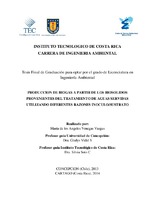Producción de biogas a partir de los biosolidos provenientes del tratamiento de aguas servidas utilizando diferentes razones inoculo/sustrato
Abstract
The treatment systems of sewage activated sludge produce a large amount of biosolids. The biosolids, produced after removing organic matter from sewage, are characterized by their high water content. Although the water content gives the biosolids a significant volume and enhances its mechanical properties, it hampers their handling and disposal. Traditional methodologies increasingly face greater pressures due to the stringency of the legislation. The ideal solution is to combine reduction, stabilization and sanitizing techniques at the origin of biosolids.
The organic material in the wastewater biosolids can be stabilized by anaerobic digestion, in which the proteins are digested into amino acids, carbohydrates into sugars and lipids into fatty acids; the end product obtained is biogas and biosolids with a reduced volume. The use of anaerobic digestion as a process for treating organic waste is becoming more prevalent due to the need for more sustainable processes for disposal, the presence of standards for waste disposal, and the opportunity to obtain biogas. There are two aspects to consider to achieve a productive and efficient system: the substrate and inoculum type used and the nutrient content of the substrate. The objective of this thesis is to evaluate the effect of the fraction of initial inoculum on the substrate fed into the biogas produced from biosolids during the wastewater treatment.
The working methodology considers the operation of anaerobic batch systems (BMPt, Bio-Methane Potential test) under four conditions of inoculum / substrate (I:S): 1:1, 2:5, 1:2, 2:1, with the goal of optimizing the processes of anaerobic digestion. The results indicate that the increased production of methane was reached with the ratio I:S, 1:1. For the ratio 1:1, the methane production was 158,12 ml CH4 / g SV0 while lower production was 8,65 ml CH4 / g SV0 with the ratio I:S of 2:1. Furthermore, the greater total mineralization and volatile solids was obtained with the ratio I:S of 2:5 with removal of 46,16 and 53,67%, respectively. Demonstrating, the influence of the ratio I:S in biogas production from biosolids.
Description
Proyecto de Graduación ( Licenciatura en Ingeniería Ambiental) Instituto Tecnológico de Costa Rica, Escuela de Química, 2013.


